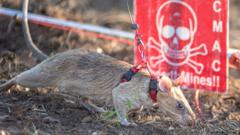A landmine-detecting rat named Ronin has made headlines for setting a world record, becoming the first of his kind to find over 100 landmines and unexploded ordnance in Cambodia. This remarkable achievement highlights ongoing efforts to reclaim land tainted by years of warfare in the Southeast Asian nation.
The five-year-old African giant pouched rat, trained by the non-profit organization Apopo, has identified a total of 109 landmines and 15 unexploded munitions since his training began in 2021. Cambodia has been left with vast quantities of unexploded ordnance from a civil war that lasted two decades and officially concluded in 1998.
According to the Guinness Book of World Records, Ronin's "crucial work" is generating a significant impact in a country where many live in constant fear of stepping onto an unseen landmine. Apopo, which operates from Tanzania, boasts a total of 104 HeroRATS, their affectionate term for these trained rodents. The rats are highly skilled at detecting chemicals common in landmines, and their lightweight bodies keep them safe from detonation.
One of Ronin's impressive attributes is his efficiency; he can thoroughly check an area equivalent to the size of a tennis court in approximately 30 minutes. In contrast, a human equipped with a metal detector could take up to four days to clear that same area. Additionally, the rats have also demonstrated their ability to quickly diagnose tuberculosis, providing a faster alternative to conventional lab testing methods.
Ronin's dedicated work, primarily in the northern Preah Vihear province of Cambodia, has eclipsed the previous record set by Magawa, another rat recognized for locating 71 landmines and awarded a gold medal for his bravery in 2020. The organization has successfully cleared a staggering 169,713 landmines and dangerous explosives globally, with over 52,000 of those in Cambodia alone.
Despite the efforts of Apopo, estimates from the Landmine Monitor suggest that between four to six million landmines and unexploded munitions are still buried across Cambodia. The charity also extends its life-saving work to other areas struck by conflict, including Ukraine, South Sudan, and Azerbaijan, working tirelessly to rid affected regions of these deadly remnants of war.


















